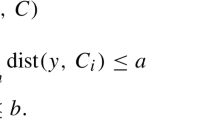Abstract
The feasible set of a convex semi–infinite program is described by a possibly infinite system of convex inequality constraints. We want to obtain an upper bound for the distance of a given point from this set in terms of a constant multiplied by the value of the maximally violated constraint function in this point. Apart from this Lipschitz case we also consider error bounds of Hölder type, where the value of the residual of the constraints is raised to a certain power.¶We give sufficient conditions for the validity of such bounds. Our conditions do not require that the Slater condition is valid. For the definition of our conditions, we consider the projections on enlarged sets corresponding to relaxed constraints. We present a condition in terms of projection multipliers, a condition in terms of Slater points and a condition in terms of descent directions. For the Lipschitz case, we give five equivalent characterizations of the validity of a global error bound.¶We extend previous results in two directions: First, we consider infinite systems of inequalities instead of finite systems. The second point is that we do not assume that the Slater condition holds which has been required in almost all earlier papers.
Similar content being viewed by others
Author information
Authors and Affiliations
Additional information
Received: April 12, 1999 / Accepted: April 5, 2000¶Published online July 20, 2000
Rights and permissions
About this article
Cite this article
Gugat, M. Error bounds for infinite systems of convex inequalities without Slater’s condition. Math. Program. 88, 255–275 (2000). https://doi.org/10.1007/s101070050016
Published:
Issue Date:
DOI: https://doi.org/10.1007/s101070050016




